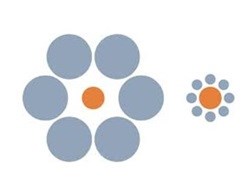Arguably the most important invention of the 20th century was not a tangible product, but a theory. In 1905 and 1915 Einstein devised his two theories of Relativity that explained the motion of objects through space, and that space and time can be thought of as being a fabric in which all matter exists. This theory paved the way from all things from satellites, GPSs, and airplane navigation.
In essence, Relativity theory (for which Einstein did not win the Nobel Prize) says that an object's speed can only be determined relative to another object, and hence, speed is not absolute. If I travel at 60 kilometers per hour, my speed is relative to a stationary object, say, next to the road. But if I drive alongside another car that is also driving at 60 kilometers per hour, then our relative speed would be zero. It would effectively be as if we are both stationary. No motion in space has an absolute benchmark; every measure is relative.
Motion in space is not where the relativity of things end. But to clarify further, let's back up a little.
The brain is fundamentally a labour-saving device - always looking to expend the least amount of energy as efficiently as possible while still ensuring your survival as best it can. In order to operate as efficiently as possible, the brain (has to) take the environment in which we find ourselves (i.e. the context) into consideration and adjust energy levels accordingly. You will be pleased to know that much of this happens automatically, below conscious awareness.
An excellent example of context's role in relativity is the Ebbinghaus Illusion:

The orange dot in the middle looks markedly larger or smaller depending on the size of the surrounding circles, even when you measure them and find them to be of the same length. Still, when you have been let in on this sleight of mind, your brain continues to interpret the dot sizes as relative. In other words, the brain compares objects in such a way to give the context appropriate meaning.
This 'principle of comparison' permeates every level of consumer decision-making. I'll share three of these with you.
In comparing with the past, consumers look at what goods used to cost (e.g. WAS: R299, NOW: R199) or see anything less than what we used to have as a loss (WAS: R299; NOW: R369 - which might still be a bargain), which famously 'looms larger than gains', according to the psychologist Daniel Kahneman.
We also compare with what is possible: we have a tendency to discount the value of goods into the future so that now is always better than later. R 100 now is always better than R150 in six months' time.
Lastly, when consumers are uncertain what to buy, they compare their decisions with others. This explains why reviews, ratings and testimonials are such a powerful tool in evaluating the relative quality of movies, books, restaurants etc.
The point I want to make is that the essence of human behaviour is relativity - humans compare, compare, and compare some more - whether consciously or subconsciously. Perception is the tool which enables the brain to more efficiently create a fit between us and an environment by interpreting context in a relative way.
Although perception is an excellent tool to leverage the power of the mind in any environment, it does give way to cognitive biases in how customers mentally process information, as mentioned above.
There are many more examples of how customers compare value relative to other constructs. Suffice to know that by not understanding how customer mental processes work and the systematic errors that can sneak in, your marketing decisions will fall, relatively, short.
